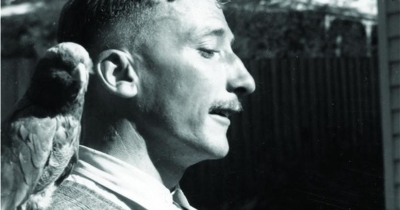Francis Webb
This week on The ABR Podcast, Toby Davidson marks the centenary of Francis Webb with an essay on the poet. Toby Davidson is the editor of Francis Webb’s Collected Poems and a senior lecturer at Macquarie University. Listen to Toby Davidson with ‘The gold standard: The centenary of Francis Webb’, published in the January-February issue of ABR.
... (read more)February 8 will mark the centenary of the birth of Francis Webb (1925-73). Many will ask ‘Francis who?’ as I did at the start of my PhD on Christian mysticism in Australian poetry, when Petra White told me, ‘You have to read Francis Webb.’ I soon found myself reading the 1969 edition of Webb’s Collected Poems in a Richmond café. It was a sturdy, well-thumbed Angus & Robertson hardback with a purple, pink, and white cover bearing a quote from British poet and critic Sir Herbert Read: ‘A poet whose power, maturity and universality are immediately evident.’ In his five-page preface, Read examined Webb’s debts to Robert Browning, Gerard Manley Hopkins, and Kenneth Slessor, before concluding:
... (read more)Francis Webb, an Australian poet born in 1925, was widely regarded by his contemporaries as one of the most gifted poets of his generation. His creative output was extensive, despite a troubled life living with a diagnosis of schizophrenia. His first major poem, ‘A Drum for Ben Boyd’, appeared in book form when he was only twenty-two. In today’s episode, listen to ABR’s Sydney theatre critic Ian Dickson read the poem in its entirety.
... (read more)The world, the tranquil punctual gyroscope,
Is more or less at peace after her fashion,
Broad bowels work, creatures rejoice or mope,
He described himself as a ‘no-hoper’ (he died in a mental hospital in the poverty of his poetry and Catholic faith). These days, the label ‘a poet’s poet’ is sufficient to scare off anyone interested in approaching a body of work that is both substantial and challenging. With the publication of this annotated collection, containing most of Webb’s known poetry and extracts from his verse dramas, it is just a little dispiriting to see Webb’s work acquire a whiff of canonical sanctity. A short, cautious introduction by the editors Michael Griffith and James McGlade concludes with the respectful praises of five eminent Australian poets, as if a show of hands from the panel of distinguished experts were enough to explain anything of the enigma of Frank Webb to someone coming across his work for the first time. I think he deserves more. In an age where packaging plays such a conspicuous role, it is time to rescue Webb from the shrine of Tradition and to make an effort towards attracting new readers to a poet who magnificently defies idle curiosity.
... (read more)



